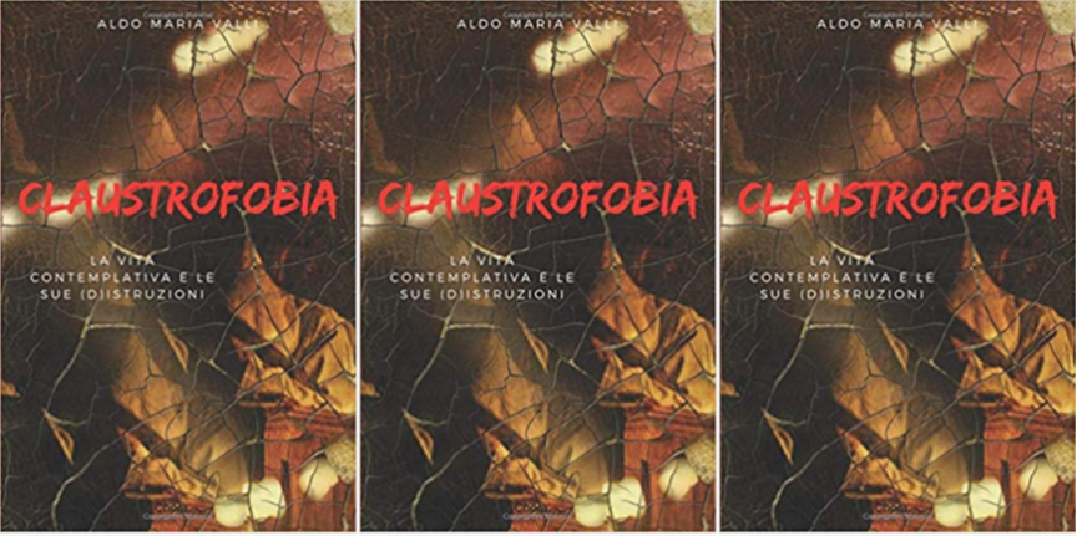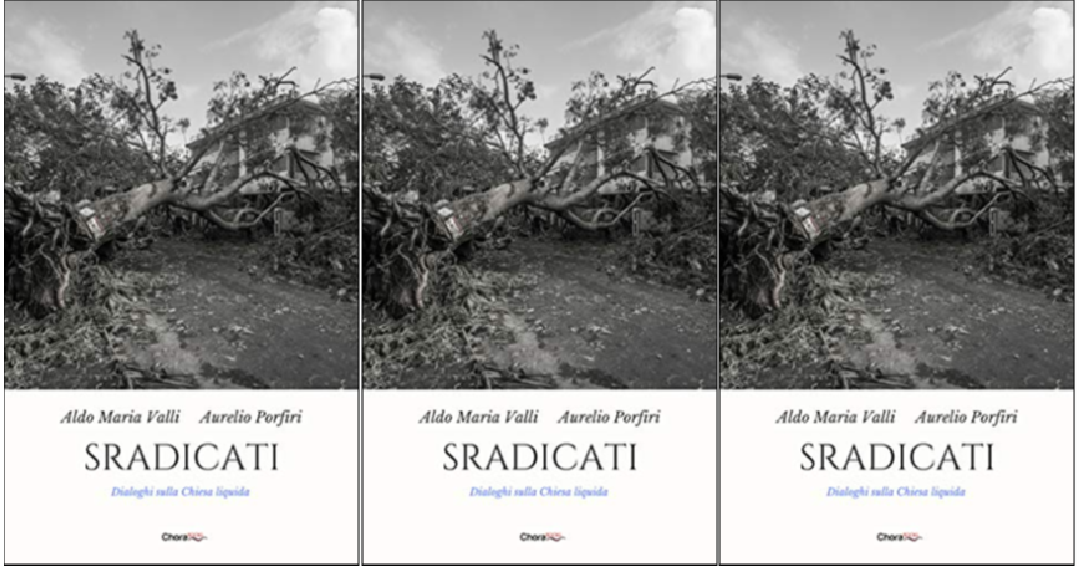How the anti-dogmatic church
has yielded to the dogma of relativism
Translated from

January 22, 2019
Dear friends, I was recently interviewed by the website
The Post Internazionale (TPI). A wide-ranging interview –
on this pontificate, the situation in the church, relationship with Islam… Have a good read!
***************************************************************************************************************************************************************
RAI's Vaticanista Aldo Maria Valli:
‘Europe will soon be Eurabia… and the Pope
is overturning what his predecessors taught’
An interview by
by Vincenzo Fiore

January 22, 2019
“What else are these churches if not the sepulchers of God?” the Nietzschean madman screamed as he intoned the
Requiem aeternam for the God he had proclaimed dead.
If at the end of the 19th century, that ‘greatest announcement’ was greeted with incredulity by believers and with ilarity by atheists, today the situation appears completely reversed. The church herself – or at least part of her – seems to be taking note of her own agony.
[Not that the 'death' of 'the church' means the death of God!]
Aldo Maria Valli, Vaticanista of RAI and a leading intellectual in the Catholic world, tries to imagine a future in which cathedrals would be completely empty and paradise, rightly or wrongly, will simply be a fable for children.
The Emeritus Pope, Joseph Ratzinger, wrote in 1969 that the Church had started her journey towards her own end, with priests increasingly transformed to social workers and the faith reduced to a political vision. Where are we today?
That process has progressed very much. Since the Second Vatican Council, the Catholic Church has become increasingly involved in social issues and has paid increasingly less attention to the Last Things – death, judgment, hell and heaven. In her attempt to dialog with the world, the Church has stopped concerning herself with souls and their eternal salvation.
And under this pontificate, this tendency has been accentuated as never before. Francis has shown that he has a totally horizontal view of faith. The overwhelming majority of his interventions has been dedicated to social and economic problems. I am not saying that the Church should not concern herself with these, but we have now reached an extreme point: On the part of the Church, there is a deafening silence about the supernatural. We now have a mundanized (worldly) church which no longer speaks of original sin and does not announce redemption. A degenerate church that has lost its nature.
In your pamphlet, Come la Chiesa finì (How the church ended) (Liberilibri, 2017), you wrote about the conversion of te Catholic Church into the New Anti-Dogmatic Church. What did you mean by that?
I am saying that the Church, in order to please the world and be sympathetic, friendly, attractive to the world, has embraced the ideal of ‘renewal’ and renounced the idea of truth.
Because the world says that truth, in the absolute sense, does not exist and cannot be known, but that at the most, many truths exist which must co-exist, the Church to conform to this thinking, must renounce her dogmas and thus, again, denatures herself and flattens herself to the level of the world.
Dogma is a truth of faith that is taught by the Church. As such, it cannot be relativized.But since the world is dominated by relativism and subjectivism – eternal and absolute laws do not exist, and only what the individual experiences is true – the mundanized Church follows the same line. With devastating results, because by no longer announcing the truth of Christ, she fails in every aspect: she is no longer concerned with the salvation of souls and no longer has anything original to say to mankind.
In my book, set in a not too imaginary fuure,I describe an ex- Catholic Church which, ashamed of dogmas, has been reduced to an ugly copy of the Protestant churches. She has adopted relativism and made it her own, preaches situational ethics (laws are adaptable to individual cases and there are no longer any absolute principles). She no longer even possesses the vocabulary to announce eternal truths, and at a certain point, to finish off the operation, decides to change even her ‘social reason’ for being and declaresherself new and anti-dogmatic.
Would the disintegration of dogma not make way for better critical thinking and therefore, for better freedoms?
No. Today, it is fashionable to say that the Church should go ‘outwards’, meaning she should be less dogmatic, less doctrinal and more pastoral. But a Church without dogmas and doctrine, or with diluted doctrine, is not a more pastoral church – one that is more attentive to man and his needs, but rather a leaderless church, prey to arbitrariness, and a succubus of the world and her dominant tendencies at any given historical moment.
The heart of doctrine is the revelation of God’s plan to each of is creatures, and this doctrine is immutable. The mission of the Church is to root herself in that doctrine and to announce it to man in every age. If she does not do this then she betrays herself, and instead of confirming the faithful in their faith, she confuses them and leads them to perdition.
When the church surrenders to the anti-dogmatic principle, then she is really adopting the central dogma of relativism, which is that "whatever I think about God and man makes no difference because God is everywhere and I can depict him as I please". So she also falls into the trap of historicism, whereby the key to understand the meaning of human reality is not faith with her dogmas, but history itself.
Thus, the Christian proposal is reduced to a vague moral exhortation without reference to divine eternal truths, and nothing is said about the justice of God. We see it very well in this pontificate, whose central teaching is that God is obliged to pardon everything even as his creatures have the right to be pardoned.
Your narrative fiction in the book seems to hide a great malaise. One senses the unease of a believer who no longer recognizes the voice of his church. Can one consider this a veiled criticism of Francis’s pontificate?
Certainly. I use paradox, sarcasm, pungent humor (a reader notes that one laughs in order not to cry), but my criticism of this pontificate is open. I think that Francis, especially after Amoris Letitia, the 2016 apostolic exhortation published after two ‘family synods’, threw the doors of the Church wide open to relativism and situational ethics. He has overturned the teachings of his predecessors John Paul II and Benedict XVI. Ambiguity reigns supreme.
What do you think of Cardinal Kasper’s recent words on German TV that “At the Vatican, many are hoping for a new Conclave”?
I think that Cardinal Kasper, one of the great inspirers of the Bergoglian line, has shown that in this pope’s ‘magic circle’, there is a great deal of nervousness.
- Those famous reforms have not come to pass.
- There is total confusion.
- The principle of mercy, which it keeps announcing to the world, is not applied within the Vatican itself, and
- Many testimonials coming from the VAtican speak of a dictatorial regime and a climate of terror.
This pontificate is going through a very critical time. It is not surprising that the pope is programming more and more trips abroad which he thinks will assure him of consensus among the faithful, while at the same time, it allows him to get out of the quicksands in the Vatican.
You have maintained that the church speaks too much about mercy and has expunged the word justice from her language. Can you tell us more?
As I said earlier, since the Church no longer concerns herself with the question of sin - the word itself is no longer used, since the preference is to speak of ‘frailty’ or 'weakness'
- the Church no longer advises necessary contrition (the sense of remorse and repentance that comes from one’s consciousness of sin),
- she ignores the problem of conversion [changing one’s heart towards goodness from evil], and
- transforms divine mercy in a sort of divine duty to forgive, as if God's creatures had the right to be forgiven whatever choices they make.
The silence about divine justice is most serious because it distorts the idea of divine mercy.
- God is, indeed, a good and merciful father ,but he is not accommodating and relativistic.
- Like any true father, he takes every child seriously and the freedom he has endowed him with.
- Precisely because of this, he shows him the way of truth and goodness.
- God judges man. To dislodge this fact from man’s conscience is not a work of mercy – it is something diabolical because it delivers man to perdition. Which is exactly what the devil wants.
Benedict XVI has come to be seen as the last bulwark of a Catholicism which resists with the purity of doctrine. But was he not perhaps, among the most revolutionary, in choosing to abdicate the Chair of Peter?
He certainly showed himself as someone who is very free. I wouldn’t say revolutionary, but free, yes - independent. Certainly he must have thought that his renunciation would help the church out of a difficult situation, but in my humble opinion, he predicted wrongly. What he did was to give free rein to the ranks of the modernists with all the consequences we are now seeing, in which today, and very much to the point, the Church has embraced relativism.
Can Islam be a concrete menace to Christian Europe?
It is not just that it can be – it already is. Islam does not recognize the idea of dialog and compromise. It only knows the logic of conquest. The word jihad has the connotations of an internal battle, an effort to be better, but also that of a war in the name of Allah.
And so the Christian West will be conquered and converted.
- When we speak of a moderate Islam, we are really just projecting a category we have but which they don’t.
- For the true Muslim, to be moderate is to betray Islam.
- The God of the Koran has little to do with the God of the Bible. He is not a God who relates to man but one who imposes.
- Totally absent in Islam is the message of love which is at the center of Christianity.
- If we add to all this the demographic question, then the picture becomes even more tragic, and the so-called Eurabia no longer seems too far away.
To paraphrase the title of one of your earlier publications, Il diavolo in piazza San Pietro e altri racconti (The devil in St. Peter’s Square, and other stories) ( Àncora, 2015), is the devil loitering through St. Peter’s?
Of course. It is not accidental that the text of an exorcism is inscribed at the base of the obelisk that is found there.
*************************************************************************************************************************************************************
The indefatigable Valli has just written another book on yet another aspect of Bergoglio's destruction of the Catholic Church...

Claustrofobia: Contemplative life and its destruction. [The Italian title plays on the word 'instructions' (istruzioni) referring to the pope's new decrees radically changing the nature of the cloistered orders, which the
insertion of the letter 'd' before istruzioni,changes the word to distruzioni (destruction).
The publisher's blurb reads:
A life of prayer, contemplating the divine mysteries and in reparation for the sins of the world, is a great treasure which has been conserved in convents and monasteries that have lasted centuries. But today it is in great danger. Not from an exterenal attack but by the initiative of the Catholic hierarchy at its summit.
The attack comes from Pope Francis's Apostolic Constitution Vultum Dei quaerere and the instructions for its application, Cor orans, a normative mechanism that threatens the autonomy of monasteries, weakens their independence, and with the pretext of aggiornamento (updating) and 'correct formation', questions the very idea of isolation and the cloistered life.
Why this sudden 'claustrophobia' on the part of the Vatican? Why must it dilute the choice of those who decide to consecrate their lives to prayer behind cloisters? One finds behind this decision an idea of spirituality which is totally horizontal - everything played out in a that is incapable of seeing the beauty and grandeur of a relationship that is exclusively with God
It is a most serious situation which Aldo Maria Valli describes in his new book, highlighting the provisions of the Bergoglian decrees that are most lethal for the faith and for the Church.
Amazing what industry this pontificate and its multiple and endless offenses to the Catholic faith have inspired in Valli - once a Bergoglio supporter until Amoris laetitia. Since that time, he has written six books to expose the failings of this pontificate. Here are the five before CLAUSTROPHOBIA:

Although I posted about each of the first 4 books, I failed to post anything about SRADICATI (Uprooted) which was published in November 2018.

SRADICATI: Dialoghi sulla Chiesa liquida (UPROOTED: Dialogs on the liquid Church)
Here is the publisher's blurb:
It is a time of great divisions in the Catholic Church, divisions on important issues of great impact on the faithful but even for non-Catholics.
This book presents a dialog on some of the most important issues underlying these divisions. It is a passionate and tormented book recounting conversations between Aldo Maria Valli, a prominent Vaticanista, ad Aurleio Porfiri, a Church musisian, author and commentator.
Both involved in intense journalistic activity, they have condensed in thee pages hours of discussion, meditation and reflection, much of it against the mainstream.
Theologian Mons. Antonio Livi says in his Foreword:
"I have known Porfiri and Valli for years for different reasons. I am happy to say a few words about this book in which the two authors seek to tackle some problems of pressing relevance in the Church today, a Church that is in great crisis - 'liquid' as the subtitle of the book says.
"The authors speak as Catholics, as sincere and profound believers, and they do not fear that wat they say could brinf them enemies. Truth has rights that are superior to one's personal convenience. As the Gospel says, the truth will set us free - not the conveniences dictated by the demands of one's career...
"I wish to tell my two colleagues: do not be silenced or intimidated by those who will oppose you in public or underhandedly. Rather, in the certain awareness of defending the truth of the Gospel from heresies or from political instrumentalization, rejoice and exult if you should be persecuted!
"To suffer for the truth of Christ on this earth is a badge of merit in order to enjoy peace and joy in Paradise when our Lord Jesus Christ will say to us: "Come forward, good and faithful servant - you have been faithful even in the small things, and I shall now give you the great reward".
This book is very readable though it is dense in content and of great importance for the debate among the various kinds of Catholicism in our time.
[Modificato da TERESA BENEDETTA 28/01/2019 04:30]